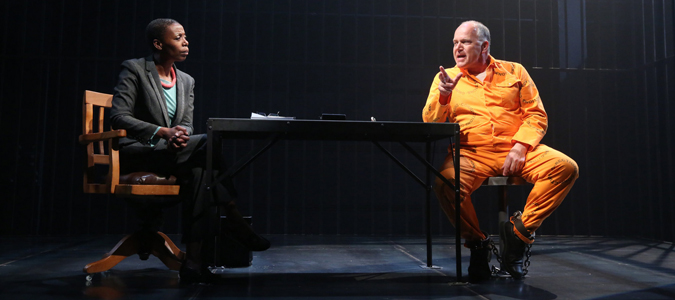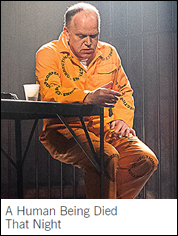

A Human Being Died That Night
Opening Night: May 29, 2015
Closing: June 21, 2015
Theater: BAM Fishman Space
Prime Evil is what South Africans call him: a paid white political assassin currently serving two life sentences for crimes committed in the name of the apartheid state. In Nicholas Wright’s play, based on the best-selling 2003 book by Pumla Gobodo-Madikizela, a black female psychologist (Olivier Award winner Noma Dumezweni) enters Eugene de Kock’s (Matthew Marsh) prison cell to discern man from government-sanctioned monster. In a riveting interrogation that moves from dispassionate to deeply intimate, a remorseful de Kock and his interlocutor negotiate a fraught emotional space in which fear and compassion coexist.
BUY TICKETSREAD THE REVIEWS:
May 31, 2015
The words are sober, almost clinical: “A Human Being Died That Night.” The play that bears this title, on the other hand, reveals in searing, sometimes heart-rending detail the atrocities committed by the South African police forces during the terrible years of apartheid. This quietly gripping and superbly acted drama by Nicholas Wright, a Fugard Theater production at the Brooklyn Academy of Music through June 21, is adapted from the book by Pumla Gobodo-Madikizela, a psychologist who served on the Truth and Reconciliation Commission. The commission was established after the end of apartheid in part to hold accountable the perpetrators of the violence used against participants in the anti-apartheid movement. Ms. Gobodo-Madikizela, portrayed by Noma Dumezweni, is one of the two principal characters in the play, which is mainly set in a cell in Pretoria Central Prison. The other is Eugene de Kock (Matthew Marsh), the head of a covert counterterrorism unit responsible for the killing and torture of dozens, who became one of the most notorious of the men brought to trial. He was given the nickname Prime Evil, and we learn that at the time Ms. Gobodo-Madikizela began a series of visits to Mr. de Kock he was serving two life sentences plus 212 years for “political crimes.” Eugene at first doesn’t understand why Pumla has come, although he cordially welcomes her, making an awkward joke comparing their encounter to the movie “The Silence of the Lambs.” She says she specializes in lectures on “issues of forgiveness and reconciliation,” and was intrigued when she witnessed Eugene ask to apologize privately to the wives of three black policemen whose killings he was involved in.
READ THE REVIEW


















